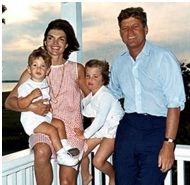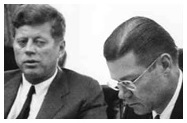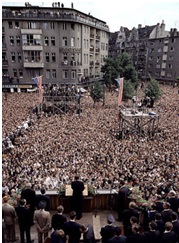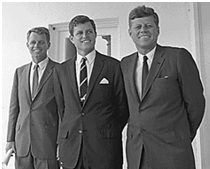|
 |
|
 |
|
|
||
John F. Kennedy Leadership
John F. Kennedy (1917-63)
American president (known as JFK, pictured right), who captured people’s imagination worldwide. His 1,000 day presidency (1960-3) was ended by assassination in Dallas, Texas. His brother and main adviser, Bobby, was also killed in 1968 during his presidential campaign.
For more detail see... The March on Washington in the History Highlights section.
What can we learn from his leadership?
1. Style over substance He had great style and charisma (being handsome, charming and articulate, with a stylish wife, Jackie, pictured right together with their children in 1962), In 1960 an ex-Massachusetts mayor said that he: “makes people want to believe in him”. But his achievements were limited, although vitally important:
He also made mistakes:
2. Character counts Despite his political ideals (see point 3), he lacked principles, compassion and self-control and wasn’t a good example for the rest of America to follow. He left himself open to blackmail and ridicule through his
He learnt from his father, Joe, that winning is all important, even if it means doing something unethical. His family motto was “second best is a loser”. But he was courageous enough to:
3. Learning During the Cuban Missile Crisis (pictured right with his Secretary of Defence, Robert McNamara), he asked his military chiefs and political advisers questions and withheld his views, so they could honestly express their own opinions and possible options. This gave him the best information and advice to make decisions.
4. Inspirational vision He inspired many Americans to be idealistic and fight for freedom and equality, particularly with his charisma and great speeches. “Ask not what your country can do for you; ask what you can do for your country”, he said in his Inaugural Address in 1960. 5. Determination He was determined to overcome these problems:
. John was the first Catholic president.
6. Pragmatism His policies were based more on their popularity than his principles, which he adapted to suit the needs of different situations. For example, he was sometimes tough with Russia (e.g. his rousing “Ich bin ein Berliner” speech at the Berlin Wall in 1963, pictured right), but also conciliatory (as in the Cuban Missile Crisis). He once described himself as “an idealist without illusions”, because ideals can easily get lost in the dirty business of politics.
7. Luck and support His family’s great wealth and political connections helped him become president - he is pictured right with his two younger brothers (Bobby, left, and Ted, centre). “With the money I spent, I could have elected my chauffeur”, said his father, Joe. He was helped by many people, particularly his brother, Bobby, who was his closest political adviser.
Best biography Robert Dallek, An Unfinished Life: John F. Kennedy (2003)
Key quote on society Ask not what your country can do for you; ask what you can do for your country.
Key quotes on change Change is the law of life. The time to mend the roof is when the sun is shining. In a crisis, be aware of the danger – but recognize the opportunity.
Key quote on influencing people Do not pray for easy lives. Pray to be stronger men.
Key quote on leadership I am an idealist without illusions. Leadership and learning are indispensable to each other.
Key quote on negotiation “Let us never negotiate out of fear. But let us never fear to negotiate”.
Key quote on learning and education The human mind is our fundamental resource. Too often we...enjoy the comfort of opinion without the discomfort of thought
Key quotes on success When power leads man towards arrogance, poetry reminds him of his limitations.
Key quote on war Mankind must put an end to war or war will put an end to mankind.
Key quote on America I look forward to a great future in which our country will match its military strength with our moral restraint, its wealth with our wisdom, its power with our purpose.
Key quote on health The effectiveness and creativity of the individual must rest, in large measure, on his fitness and vitality. |
|
|
||
|
|
||
| Copyright © wisdomtowin.com 2025 All Rights Reserved | ||
|









